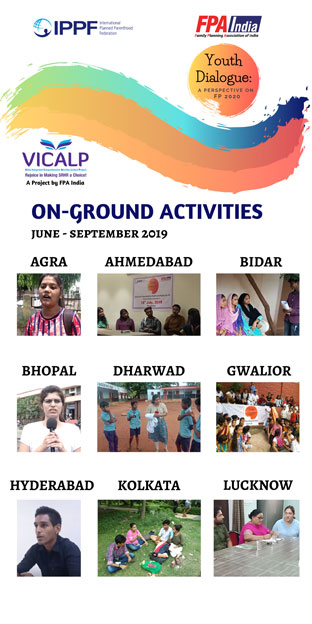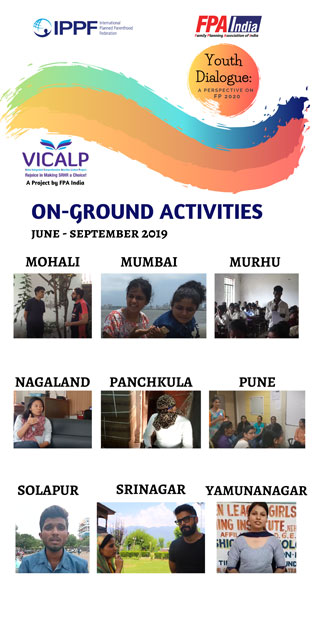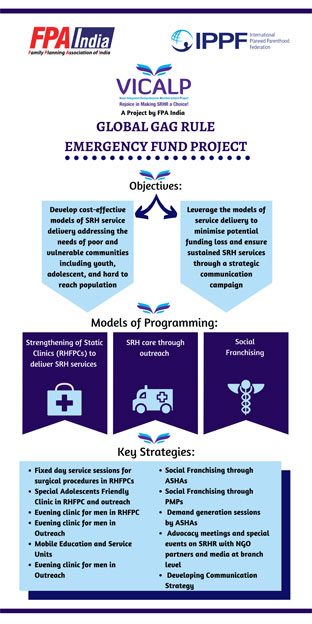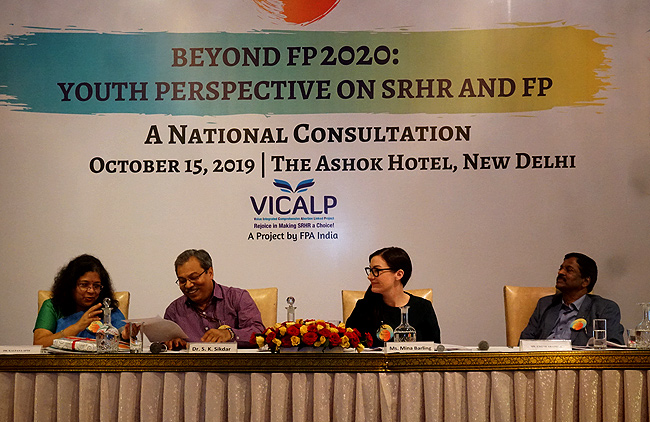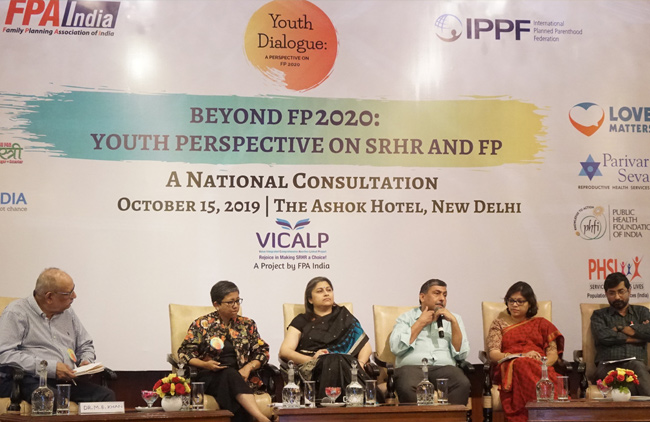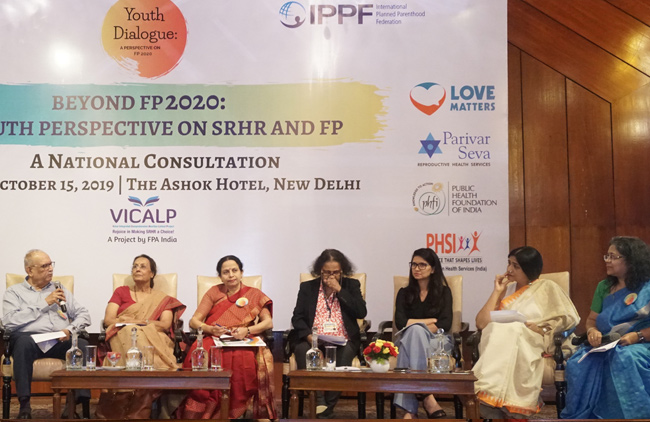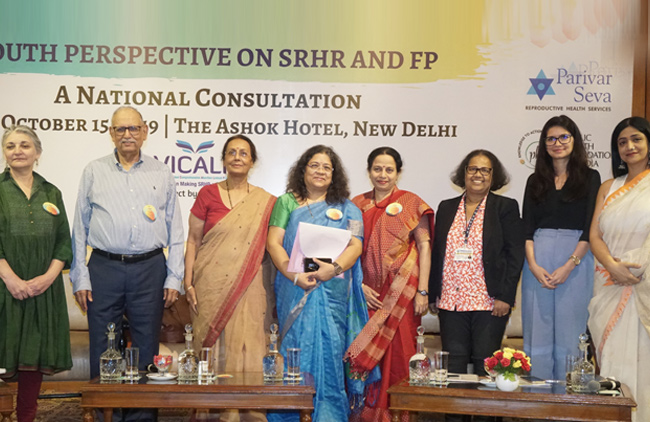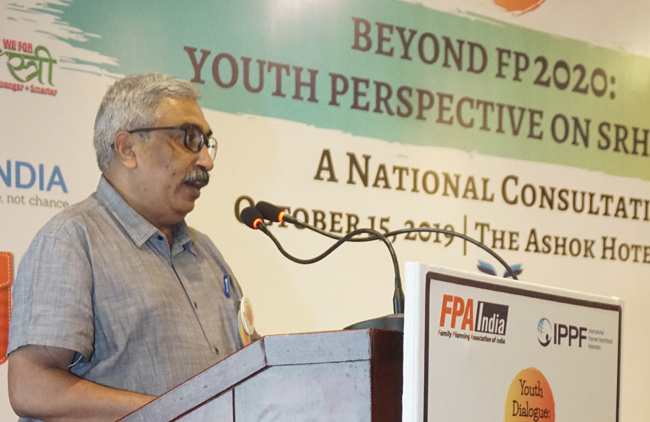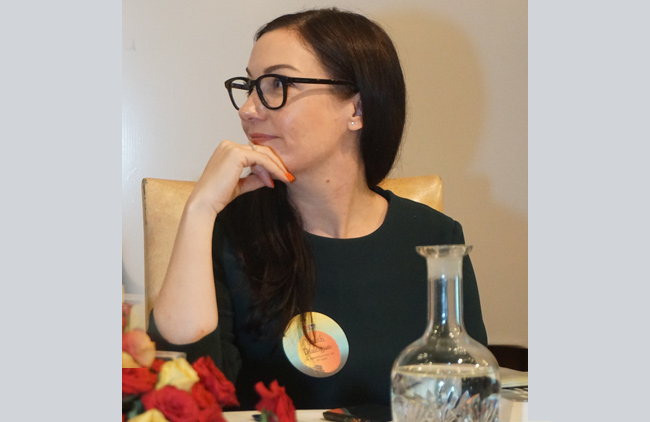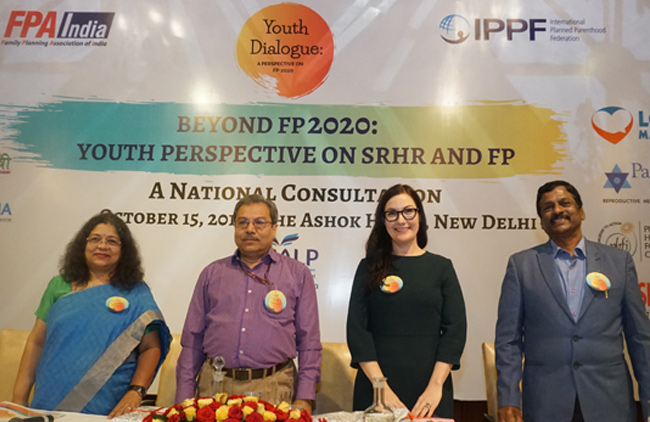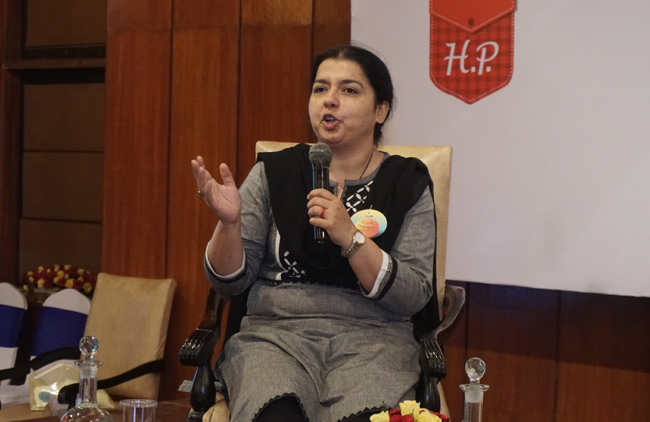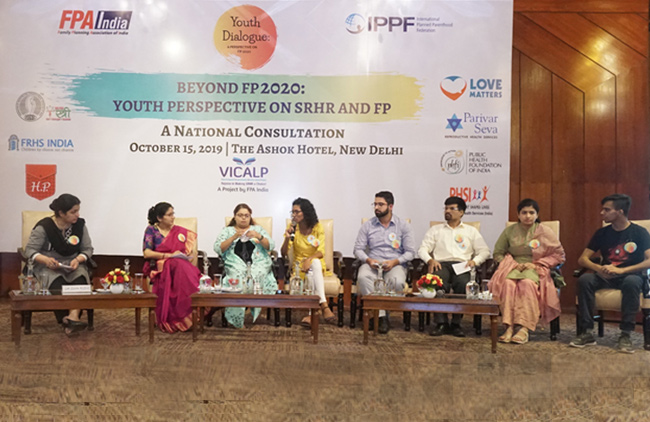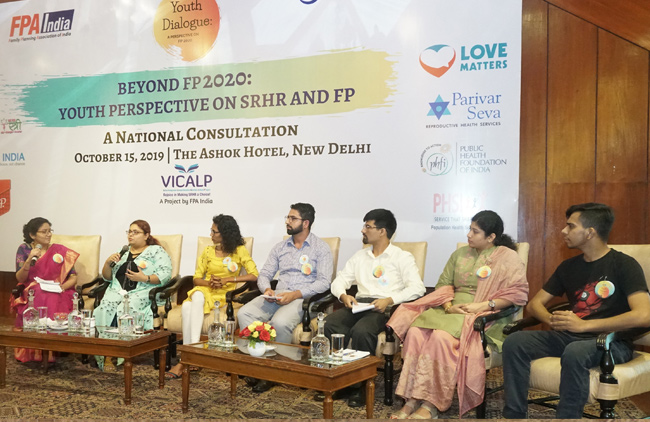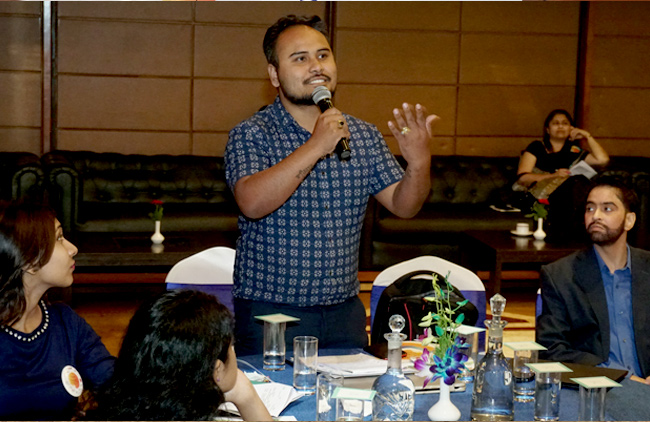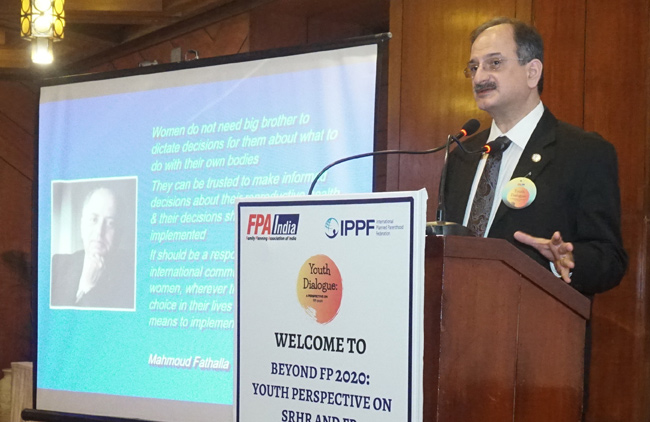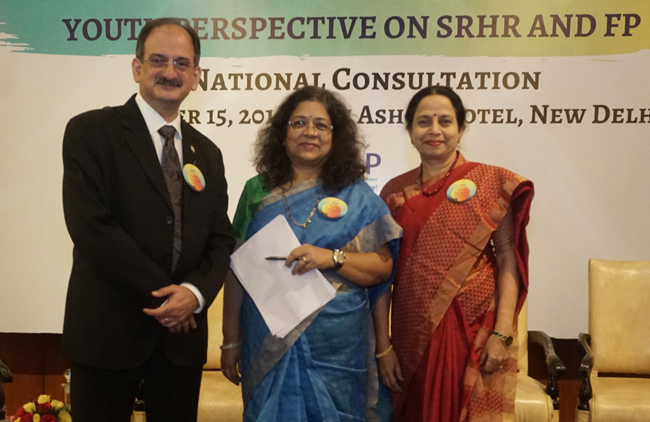National Consultation 2019
Beyond FP2020: Youth Perspective on SRHR and FP - A National Consultation
Vision FP2020 for India goes beyond providing contraceptive services to an additional 48 million users, to averting 23.9 million births, one million infant deaths and over 42,000 maternal deaths by 2020.
According to the United Nations Population Fund, India will retain the biggest national adolescent girl population from 2010 to 2030, contributing to highest adolescent pregnancies in the world. It is this large base of young people which imparts momentum to the growth of population.
The unique demographics of the country, consisting of the largest population of young people, demand for a varied and innovative approach to ensure that the needs, preferences and expectations of a burgeoning population of young people in India are met.
The youth dialogue
The Family Planning Association of India (FPA India), over seven decades, has been striving to reach out to unreached communities with comprehensive sexual and reproductive health (SRH) care in collaboration with like-minded government as well as private agencies, to create a robust supply and demand-based system for family planning. There are many questions that remain partially answered. Over a period of time, these concerns need to be responded to and understood from a youth perspective to ensure that the largest population in India is heard and their concerns are addressed.

Measures to widen contraceptive choices need to run alongside equal emphasis on quality of services and the involvement of communities at the ground level. The discussion around rights and empowerment needs to be central to the process of furthering the FP2020 agenda. Sensing the need of the hour, FPA India, along with its partners, launched a nationwide campaign, ‘Youth Dialogue - A Perspective on FP2020’, to create an enabling, stigma-free environment and spread awareness on sexual and reproductive health and rights for all.
The campaign mobilised more than 8,000 young people representing diverse groups disaggregated by age (those between 15-18 years and between 18-24 years), sex, marital status, and residing in various cities, towns, slums and villages to share their experiences, needs and expectations on SRH care, including family planning. The campaign was conducted across 13 states with an aim to connect young people to drive the dialogue across all platforms, using both online and offline channels of communication.
Step ahead – a national consultation
To take the mantle forward, FPA India, under the Global Gag Rule Emergency Fund Project, proposed to organise a national consultation, ‘Beyond FP2020: Youth Perspective on SRHR and FP’, to bring together important stakeholders from the Ministry of Health and Family Welfare, various government agencies, private sector, civil society and its vibrant youth volunteers.
The consultation held at New Delhi on October 15, 2019, in the presence of Dr SK Sikdar, Deputy Commissioner, In-charge, Family Planning Division, Ministry of Health and Family Welfare; Mina Barling, Director of External Relations, IPPF CO, and other dignitaries and representatives from civil society and the social sector working on sexual and reproductive health, family planning (FP) and youth.
Although the consultation had the agenda of sharing the voices of youth with their opinions and expectations, it cross-cut segments, and rights-based approach to SRH service delivery, how to expand services to reach out to most neglected populations, different models that can be adapted to widen the SRH services and how to expand the FP choices, access and quality for young people were also covered through detailed panel discussions in the presence of youth, stakeholders and service providers.
The consultation commenced with a montage of the experiences of youth across the country captured by FPA India’s youth volunteers. A presentation on the nationwide campaign run by young people amplified their needs, rights and wants around FP and other SRH issues. It was taken forward through sessions reflecting on reframing the national discourse on FP through a rights-based, youth-centric lens. It also shed light on ways to create multi-stakeholder engagement to maximise access, choice and quality of SRH, including FP beyond FP2020.
The purpose of the consultation was to create a common platform for all the stakeholders to analyse the current trends, examine the latest demographic, clinical and field-based evidence, and collaborate to maximise the impact of FP and SRHR programmes for young people in India.
Some of the key points discussed during sessions are illustrated below:
- Education and sexuality education:
Young people lack credible and reliable sources of information and education in regional languages around sex and sexuality, contraception and family planning. Further, with decline in enrolment for secondary and higher education, the road to access knowledge becomes narrower.
Lack of awareness and resources to create special sex and sexuality education material for people with special needs such as limitations to see, hear, talk and communicate prevent access to even basic knowledge on SRH for people with special needs.
- Gender discrimination:
Due to gender disparity and social norms, most women and girls are unable to access healthcare, including FP and maternal healthcare services.
- Gender and sexual orientation:
Young people representing various sexual orientations face violence and discrimination even in cities across India, whilst seeking contraception and clinical services. Thus, the population remains invisible when it comes to considering their SRH needs.
- The conflation between legal provisions:
The conflation between various legal provisions such as MTP Act, POCSO Act, Child Marriage Act not only prevent people from accessing healthcare but also creates a dilemma for healthcare providers due to lack of clarity and fear of failing to adhere to the legal system. These provisions are primarily established with a vision to safeguard the rights of people, but impact the access of SRH care.
- Access to contraception in open market:
The stigma attached to young and unmarried population accessing FP services leads to an increase in the unmet need of FP.
Delivering on India’s FP2020 commitment requires a deep-dive into the challenges of programme implementation mapped to individual needs, and a review of the barriers to creating an enabling environment. There is a need to assess how well-aligned the National FP Programme is to capture the FP needs of young people from a rights perspective.
Recommendations:
The learnings from the youth dialogue and national consultation will be taken further for collaboration between the government, civil society, commercial sector and donors, to deliver and measure a robust FP programme that is strong on supply and responsive to demand. Efforts will be made towards making the Government of India acknowledge it as a right and not just a need, and taking necessary actions to fulfil unmet FP needs.
While team FPA India is working with other partners on recommendations to be submitted for system and policy level changes, some of the key points which may be considered for recommendations to address supply side gaps are given bellow:
- Improve the quality of counselling at the facility level by RMNCH+A and RKSK counsellors, through regular orientation training as well as supportive supervision visits.
- Focus on provision of comprehensive FP and SRH services, where all methods are offered and explained to the client and she / he is empowered to adopt a method of her / his choice.
- Improve the quality of training for service providers by having regular contraceptive technology update training for medical officers as well as reorientation training for auxiliary nurse midwifes and ASHA workers.
- Work with advocacy bodies and civil society organisations to focus on quality of comprehensive FP services, with a special focus on young people.
- Undertake regular supportive supervision and monitoring visits to ensure adherence to standards, protocols and guidelines.
- Ensure effective implementation of the ‘target-free approach’ on ground.
- Ensure continuous supply of products and services by working through the private sector / social marketing route.
Points to consider for recommendations to address demand side gaps:
- Ensure a 360-degree communication approach.
- Empower frontline healthcare providers by enhancing their knowledge and counselling skills.
- Create FP and SRH champions.
- Provide community-based FP and SRH services across all states.

